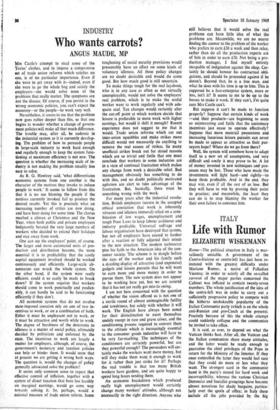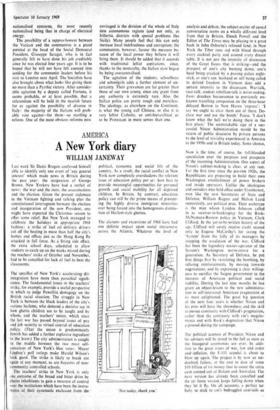Life with Rumor
ITALY ELIZABETH WISKEMANN
Rome—The political situation in Italy is mar- vellously unstable. A government of the Centro-Sittistra or centre-left has just been re- instated with the greatest difficulty under Mariano Rumor, a native of Palladian Vicenza; in order to satisfy all the so-called correnti of the major parties concerned the Cabinet was inflated to contain twenty-seven members. The whole justification of the idea of the centre-left was in order to carry out a sufficiently progressive policy to compete with the hitherto unshakeable popularity of the Italian Communist party (which is on the whole anti-Russian and pro-Czech at the present). Precisely because of this the whole attempt could suddenly collapse and the communists be invited to take office.
It is said, as ever, to depend on what the Vatican thinks best. After all, the Vatican and the Italian communists share many attitudes, and the latter would be ready enough to guarantee the chief privileges of the Pope in return for the Ministry of the Interior. If they once controlled the latter they would feel sure that they could do more or less what they want. The strongest card in the communist hand is the party's record for hard work and incorruptibility, whereas the various Christian Democrat and Socialist groupings have become almost notorious for shady bargains, particu- larly over the spoils of office; in Italy these include all the jobs provided by the big nationalised concerns, the most recently nationalised being that in charge of electrical energy.
The possibility of a rapprochement between the Vatican and the communists is a pistol pointed at the head of the Social Democrat President, Giuseppe Saragat, who is in fact generally felt to have done his job creditably since he was elected four years ago. It is to be hoped that he will not have felt coerced into sending for the communist leaders before his visit to London next April. The Socialists have also brought about what looks like giving them no more than a Pyrrhic victory. After consider- able agitation by a deputy called Fortuna, it seems probable, or at least possible, that a referendum will be held in the nearish future for or against the possibility of divorce in Italy: the majority of the Italians will prob- ably vote against—for them—so startling a reform. One of the most obvious reforms now
envisaged is the division of the whole of Italy into autonomous regions (and not only, as hitherto, districts with special problems like Sicily). Many people feel that this can only increase local indebtedness and corruption; the communists, however, favour the measure be- cause of the local power they believe it will bring them. It should be added that it accords with traditional leftist aspirations, since, thanks to the monarchy, the Italian state began by being overcentralised.
The agitation of the students, schoolboys and schoolgirls adds a further element of un- certainty. Their grievances are far greater than those of our own young, since any grant from any authority is extremely rare. Also the Italian police are pretty rough and merciless. The ideology, as elsewhere on the Continent, is what the young call Chinese, or else it is very leftist Catholic, so anti-hierarchical as to be Protestant in more senses than one.



































 Previous page
Previous page